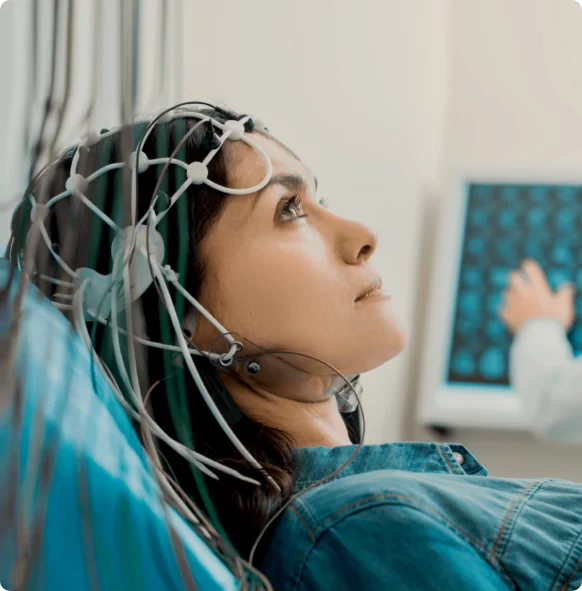Electroencephalogram (EEG)
At Brisbane Neurology, we understand that undergoing medical tests can be daunting, especially when it involves the brain. Our team is here to provide you with expert, supportive care as you undergo an EEG test. Our goal is to ensure you feel comfortable and well-informed throughout your experience.
What is an EEG?
An EEG is a test that measures the brain’s electrical activity using small electrodes placed on the scalp. This non-invasive test records brain wave patterns, which can provide important insights into the functioning of the brain. During a routine EEG, these brain waves are captured over a short period, creating a snapshot of brain activity that can be useful for diagnostic purposes.
Conditions Diagnoses
An EEG is commonly used to diagnose neurological conditions, such Epilepsy and other seizures.
If a routine EEG does not reveal abnormal activity but epilepsy is still suspected, a sleep-deprived or prolonged EEG may be recommended to gain more information. In some cases, a normal EEG can help rule out seizures as the cause of these episodes. Your doctor’s referral will advise us which EEG they require you to have.

Types of EEGs Available at Brisbane Neurology
We offer a range of EEG services tailored to your diagnostic needs:
- Routine EEG (20 minutes)
- Sleep-Deprived EEG (1 hour)
- Prolonged EEG (1 hour)
Our EEGs are suitable for adults and children over 16 years of age (we cannot perform testing on children under 16 years of age). If your doctor has requested an EEG, they may have also requested a consultation with one of our neurologists. At your consultation, the neurologist will discuss the results with you and coordinate with your referring doctor or create a treatment plan if needed. If your neurologist has requested we perform an EEG, we will send them the report and they will discuss the results of the test with you in your next consultation. Routine EEG appointments are available on Wednesdays, with options for urgent EEGs as required. Please reach out to us (via email) if you or your doctor have specific timing needs.
Risks Associated with an EEG
An EEG is a minimally invasive and generally safe procedure with no pain or other risks associated. Discs are placed on your scalp to record electrical signals. However, these discs do not produce signals, meaning there is no risk of electric shock.
Patients with a condition that causes seizures (such as epilepsy) may experience a seizure during the test. If you have any concerns about possible seizures, please discuss with one of our neurologists prior to your test.
Refer your patient
Send your referral to us via email